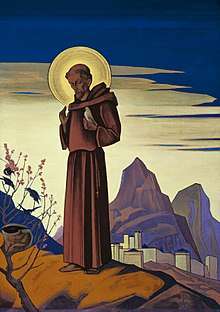All Creatures of Our God and King
"All Creatures of Our God and King" is an English Christian Easter hymn by William Henry Draper, based on a poem by St. Francis of Assisi. It was first published in a hymn book in 1919.[1]
| All Creatures of Our God and King | |
|---|---|
 St. Francis | |
| Genre | Hymn |
| Written | 1225 |
| Text | St. Francis of Assisi |
| Based on | Psalms 148 |
| Meter | 8.8.4.4.8.8 with refrain |
| Melody | "Lasst uns erfreuen" |
History
The words of the hymn were initially written by St. Francis of Assisi[2] in 1225 in the Canticle of the Sun poem, which was based on Psalm 148.[3] The words were translated into English by William Draper, who at the time was rector of a Church of England parish church at Adel near Leeds. Draper paraphrased the words of the Canticle and set them to music. It is not known when Draper first wrote the hymn but it was between 1899 and 1919.[4] Draper wrote it for his church's children's Whitsun festival celebrations and it was later published in 1919 in the Public School Hymn Book.[1] The hymn is currently used in 179 different hymn books.[2] The words written by St Francis are some of the oldest used in hymns after "Father We Praise Thee", written in 580 AD.[5]
Like "Ye Watchers and Ye Holy Ones", Draper's text is usually set to the tune of "Lasst uns erfreuen", a German Easter hymn published by Friedrich Spee in 1623 in his book Auserlesene Catholische Geistliche Kirchengesäng.[6][7] This tune became widespread in English hymn books starting with a 1906 arrangement by Ralph Vaughan Williams.[8][9][10][4][11] John Rutter also wrote a piece of music for the hymn.[12] Despite the hymn being initially written by Draper for Whitsun (the Anglican and English designation for Pentecost), it is mostly used in the earlier weeks of the Easter season.[13]
Melody
The most common melody is the 1623 German hymn tune Lasst uns erfreuen.[2] The following setting is from the 1906 English Hymnal, with the lyrics quoted from the 1986 New English Hymnal:[14][15]
In popular culture
In the United Kingdom, the hymn was prominently featured in the pilot episode of the comedy programme Mr. Bean, where the title character is in church when the congregation sings "All Creatures of Our God and King", but he has no hymnal and his neighbour refuses to share. The only lyric he can participate in is the recurrent "Alleluia".[16]
In the United States, it was covered by the David Crowder Band on the album Can You Hear Us? in 2002.[17]
References
- "All Creatures of Our God and King". Cyber Hymnal. Archived from the original on 2014-03-27. Retrieved 2014-03-13.
- "All Creatures of our God and King". Hymnary.org. Retrieved 2014-03-13.
- "All Creatures of Our God and King (MHB 28)". The Christian Sentinel. 2010-06-01. Archived from the original on 2016-02-11. Retrieved 2014-03-13.
- Osbeck, Kenneth W. (1982). 101 Hymn Stories (reprint ed.). Kregel Publications. p. 20. ISBN 0825434165.
- Pascall, Wayne (2009). Understanding the Hymns We Sing. Wayne Pascall. p. 8. ISBN 144862651X.
- "Friedrich Spee: der Reformer der Poesie und die Revolution des katholischen Kirchengesangs". H-Soz-u-Kult. 2007. Retrieved 2014-03-27.
- "Lasst uns erfreuen". Hymnary.org. Retrieved 2014-03-27.
- Anglican Hymn Book (1965). London: Oxford University Press. #251.
- The Hymnal 1982. The Episcopal Church. New York: Church Hymnal Corp. #400.
- New English Hymnal (1986). Norwich: Canterbury Press. #263
- Chalice Hymnal. Chalice Press. 2003. p. 49. ISBN 978-0-8272-8035-9.
- "VocalEssence Ensemble Singers celebrate the music of John Rutter at Central Lutheran Church". Twin Cities Daily Planet. 2014-03-24. Retrieved 2014-03-27.
- Bartlett, David (2009). Feasting on the Word: Preaching the Revised Common Lectionary, Volume 6. Westminster John Knox Press. p. 460. ISBN 0664231012.
- Wilson, John (Winter 1980). "Treasure No 46: The Tune 'Lasst uns erfreuen' as we know it". Bulletin of the Hymn Society of Great Britain and Ireland. IX.10 (150). Retrieved 13 April 2017.
One of the great successes of The English Hymnal in 1906 was its inclusion of the old German Catholic tune 'Lasst uns erfreuen', linked originally with Easter rejoicing, but now set to 'Ye watchers and ye holy ones', a new text by Athelstan Riley... The EH attribution of the melody was to the book [Auserlesene, Catholische,] Geistliche Kirchengesäng (Cöln, 1623)...
- "Hymn 519". The English Hymnal. 1906. p. 672.
- "Mr. Bean". Mr. Bean. Series 1. Episode 1. 1 February 1990. 22:55 minutes in. ITV. ITV1.
- "David Crowder Band, "Can You Hear Us?" Review". Jesus Freak Hideout. 2002-02-26. Retrieved 2014-03-13.
